Alabama editorial roundup: Feb. 10, 2019 edition

Recent editorials from Alabama newspapers: ____ Feb. 9 The Dothan Eagle on the recent execution in Alabama: The State of Alabama put a man to death Thursday. He was the 217th person to die under the state’s death penalty – the 64th execution since a moratorium on executions in Alabama was lifted in 1983. Dominique Ray’s execution is troubling. Not because there was any question about his guilt. Debates about the moral failings of the death penalty aside, there was no reason why Ray should not see the sentence imposed on him for the murder of 15-year-old Tiffany Harville almost 25 years ago carried out at long last. What’s troubling about Ray’s execution is the constitutional question it raises. Ray, who embraced Islam while incarcerated, wanted an imam present with him in the death chamber. Prison officials refused, saying they could provide a Christian prison chaplain. Ray’s attorneys sued, and a stay of execution was issued to sort it all out. Prison officials argue that only corrections system employees are allowed in the execution chamber as a matter of security, which is reasonable. In an earlier editorial, we suggested the prison system work to create a pool of spiritual leaders from other faiths, and vet them accordingly. That seems reasonable as well. However, Ray’s position was that he was receiving unequal treatment because he, a Muslim, did not have the same opportunity in the execution chamber as a Christian prisoner would. And he’s right – the constitutional religious protections suggest that a condemned inmate of any stripe should have the same access to a representative of their chosen faith. Read the rest online: dothaneagle.com ______ Feb. 10 The Gadsden Times on the U.S. cancelling nuclear weapons treaty with Russia: Tangible is defined by “Webster’s New World Dictionary” as 1. corporeal and able to be appraised for value; 2. can be understood; definite; objective. Those are simple definitions for a wonderful word, which is just the opposite of innuendo and gossip. I prefer to deal in tangibles, but sometimes let tradition and “it has always been that way” overcome my thought process. A good example is the Russian/United States Strategic Arms Limitation Talks signed in 1972. The agreement was intended to restrain the arms race in strategic ballistic missiles armed with nuclear weapons. SALT I was followed by SALT II, which basically never took effect. Both sides have indicated nullification of the first accord. At first blush, I thought the consequences of calling a halt to the treaty could be disastrous for the populations of the U.S. and Russia. However, I came to the conclusion that the U.S. cancelling the treaty is essential to maintaining substantial military superiority over not only Russia, but our No. 1 adversary, China. While we have been limited in developing and modernizing the U.S. military by the SALT agreement with Russia, the Chinese government has been modernizing and expanding its military exponentially. The SALT agreement was an excellent deterrent to nuclear war between the then-Soviets and the U.S., but the agreement allowed China to develop a formidable nuclear military, one that has become a threat to U.S. global dominance. Read the rest online: Gadsdentimes.com _____ Feb. 9 Anniston Star on the relationship between journalists and law enforcement: An article in Friday’s Anniston Star drew the ire of the Anniston Police Department and its supporters on social media. The article reported on statistics provided by city officials detailing the frequency of police stops and arrests, breaking those numbers down according to race — black, white and other. Facebook commenters describe the article as a hit piece, fake news and an obvious attempt to attack police and sell newspapers. To the contrary, The Anniston Star works closely with Anniston PD and applauds its efforts to address crime through community policing, including the creation of a community-based committee tasked with following up on complaints from residents. No, we’re not out to get the police. Here’s what actually happened. A week ago, the NAACP held a meeting at the Anniston City Meeting Center where residents accused APD of disproportionately making traffic stops on African-Americans. Their evidence, however, was all anecdotal. Coverage of that story also provided the response from city officials and police denying any notion of racial profiling. As journalists, our aim is always to pursue truth, and collecting and reporting actual numbers is a non biased way to do that. It’s what we did when Councilman Ben Little claimed that his district’s requests for work orders consistently failed to get response from the city. An examination of the work orders, however, showed that Ward 3 actually had almost twice as many completed work orders as any of the other wards. Read the rest online: annistonstar.com ____ Feb. 8 Montgomery Advertiser on poverty It was cruel to force unemployment upon millions of Americans over a political dispute borne of a foolish promise that has nothing to do with them. It is shameful that the president showed little if any empathy for these citizens — many of whom supported him — and acquiesced via his silence to assessments made by his economic adviser, Kevin Hassett, and billionaire Commerce Secretary Wilbur Ross. Hassett said that furloughed federal workers are “better off” because “they have the vacation but they don’t have to use their vacation days.” Ross said there is no “good excuse why there … should be a liquidity crisis” and that he didn’t “understand why” federal employees with no income were going to food banks and homeless shelters. Ross incredibly advised those employees — already indebted beyond their ability to pay — to get a bank loan to cover expenses. Notwithstanding these contemporary echoes of “let them eat cake,” the previous, (un)presidential shutdown of the federal government — and the one that may reoccur next week — may force us to rethink some common misunderstandings. This third and final edition of my “start-at-the-beginning series” focuses on poverty. Next to race relations, poverty is the longest rhetorical highway along which people begin their expository
Steve Marshall: The high price of protecting the public

Barely three weeks into the New Year – a time that is supposed to be full of optimism for the future – Alabama has already reached a somber milestone. Our state is tied with Texas for the highest number of law enforcement line-of-duty deaths in the country for 2019. Two Sundays in a row, major cities of our state suffered the sudden loss of a beloved police officer. Each officer was performing his sworn duty to protect the public and uphold the law when he was fatally struck down by gunfire. Both faced danger without hesitation and both acted with courage and commitment, just as they had been trained. And each gave his life. The daily actions of our law enforcement personnel in the performance of their duties may seem routine work to the public, but they only see the outside. Behind the badge, polished shoes and friendly smile, stands a person dedicated to protecting the lives of Alabamians, even if their job places them directly in harm’s way. While there are other occupations that can be hazardous to a worker, few demand that a person enter the unknown on a daily basis to face potential personal injury and even death. Why would anyone want to take on such a job? To those who train and take an oath to become a law enforcement officer, it is not a job. It is a calling. They do not seek fame and fortune. They wear a badge with pride out of a special commitment to safeguard their community. And let us not forget the sacrifice of the families of law enforcement who wait up nights for their loved one’s return. They need no reminder of the too often perilous nature of the work of our men and women of law enforcement. All of us want to live in peace and safety, but how many would be willing to walk the beat of a law enforcement officer to help guarantee that safety? Birmingham Police Sergeant Wytasha Carter and Mobile Police Officer Sean Tuder did just that. At approximately 2:00 a.m., Sunday, January 13, Sergeant Carter was on the lookout for vehicle break-ins when he was notified of suspicious activity and responded along with other officers. Two persons were stopped in a parking lot and were being searched when one pulled out a gun and shot Sergeant Carter and another officer. Sergeant Carter lost his life that morning, but his 17 years’ service for the Birmingham, Leeds and Fairfield police departments and the Shelby County Sheriff’s Office were celebrated by a tremendous public response. Alabama sends condolences to Sergeant Carter’s family. At approximately 3:00 p.m., Sunday, January 20, Officer Tuder was attempting to serve an arrest warrant on a suspect in Mobile. During the arrest, the suspect shot and fatally wounded Officer Tuder, a three-year veteran of the Mobile Police Department who was previously honored as Officer of the Month. Prior to coming to Mobile, Officer Tuder served with the Palatka, Florida Police Department for two years. Officer Tuder’s funeral service is this Friday, and I am certain there will also be an overwhelming public turnout. His death is a painful reminder of the loss of another young Mobile police officer, Justin Billa, less than a year ago. I know I join all of Alabama in sending condolences to Officer Tuder’s family. More than 500 Alabama law enforcement officers have died in the line of duty during the last 100 years of record keeping. Each is a hero. All gave everything so their communities could be safe. There is a high price to pay for putting on the uniform of a peace officer. This month, Alabama knows as much about the sacrifice of law enforcement as any state in America. Law enforcement continues to take on more responsibility, sometimes with less manpower and funding. In addition to responding to calls of domestic violence, burglaries, armed robbery, assault, and drug trafficking-to name but a few-they also deal with homeland security concerns and the growing reach of cybercrime. As the Attorney General and chief law enforcement official for the state of Alabama, it is my honor to stand with our law enforcement as they stand on a daily basis between order and chaos. We cannot thank law enforcement enough for what they do for us, and we will never forget their sacrifice. ••• Steve Marshall is the Attorney General of Alabama.
Local and state officials react to death of Mobile police officer Sean Tuder

Sean Tuder, a 30 year-old police officer from Mobile, was shot and killed in the line of duty Sunday. AL.com reports that Tuder joined the Mobile Police Department in March 2016 and was named officer of the month in August of 2017 for his exceptional service. MPD Chief Lawrence Battiste spoke about Tuder outside of the emergency room at Providence Hospital saying, “He was one of those guys that certainly resonates in your mind as a true leader, a true commitment to doing his best in this community to keep it safe and to be a role model for others. Officer Tuder was one of those guys that believed in mentoring and help bringing other officers along.” Mobile’s Mayor Sandy Stimpson took to Twitter with a statement. Earlier today, Mobile lost one of our best and finest, Officer Sean Tuder. We send our thoughts and prayers to his friends and family during this tragedy. We mourn together as a community and we love together as a community. pic.twitter.com/PTSSOHqtoj — Mayor Sandy Stimpson (@MayorStimpson) January 21, 2019 Ashley Rich, Mobile District Attorney, posted a tribute to Tuder on Facebook which read “The city of Mobile lost one of its finest officers today. This tragedy is a stark reminder of the dangers that the brave men and women of law enforcement face everyday. I would like everyone to take a moment to remember the man who made the ultimate sacrifice while protecting our community. Please keep Officer Sean Tuder’s family in your thoughts and prayers.” Alabama Governor Kay Ivey released a statement saying, Less than a day after laying to rest Birmingham Police Sergeant Wytasha Carter, I’m saddened to learn of the death of Mobile Police Officer Sean Tuder, who was killed today in the line of duty. I extend my sincerest condolences and heartfelt prayers to Officer Tuder’s wife and family, fellow officers and to the community he served. Officer Tuder was an exceptional young officer, a true leader and was once recognized as ‘Officer of the Month’ for his commitment to serve and protect. This senseless tragedy has sadly taken the life of yet another Mobile police officer, far too soon, and stands as a reminder of the sacrifices made by those who wear the badge. To the Mobile community, know that all of Alabama joins you in mourning this remarkable law enforcement officer. Elected officials in Washington also shared condolences. Horrific news out of Mobile. Our prayers are with Officer Tudor’s family, the @MobileALPolice, and our entire community. https://t.co/fOYWBff9kJ — Archive: Rep. Bradley Byrne (@RepByrne) January 20, 2019 Praying for @MobileALPolice Officer Sean Tuder’s family following this tragic shooting. https://t.co/jQf0TkcGxP — Richard Shelby (@SenShelby) January 20, 2019
Baldwin County placing police in all schools
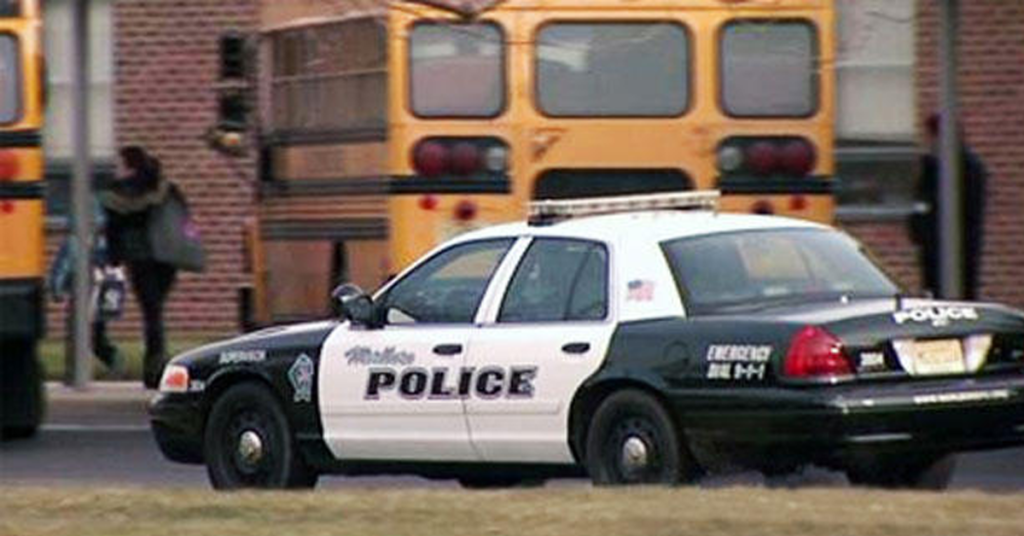
One of Alabama’s most populous counties has a plan to put armed police officers in each of its public schools. Officials in coastal Baldwin County say agencies are partnering to provide permanent school resource officers at each of its 46 campuses beginning this August. Currently, only some county schools have officers on duty constantly. Sheriff Huey “Hoss” Mack says Baldwin already has 30 school resource officers, meaning 16 more are needed. The sheriff’s office and city police departments will have to fill those positions. Officials haven’t provided details on how all the new jobs will be funded, but they say new taxes aren’t needed. School board members will consider the plan during a meeting Thursday. Baldwin County has more than 200,000 residents, and it’s located across Mobile Bay from Mobile. Republished with permission from the Associated Press.
How the media, BLM activists are pushing false narrative of Chikesia Clemons arrest and why we shouldn’t let them
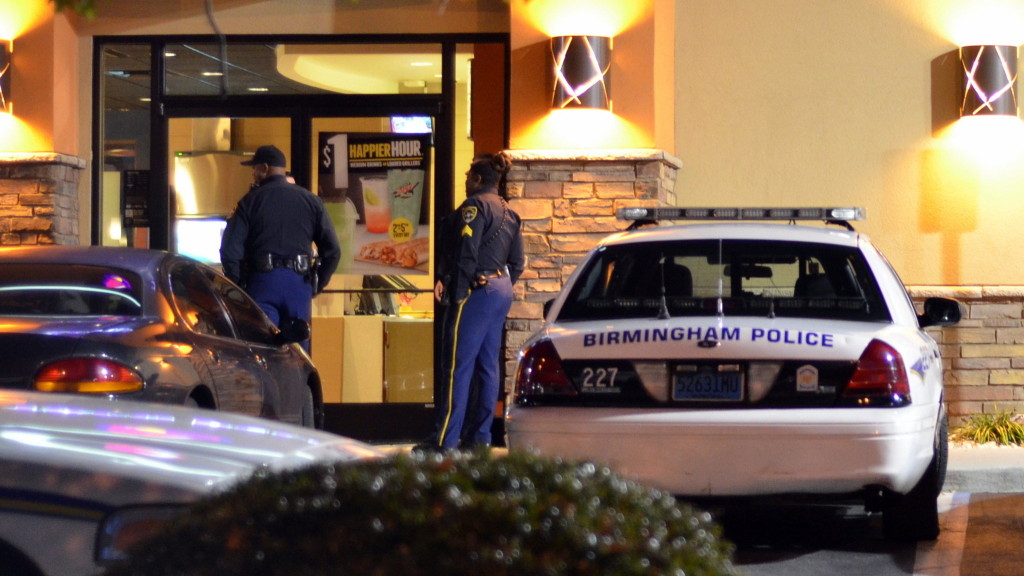
Law enforcement officers haves a tough jobs these days. Just last week two deputies in Florida were ambushed, shot and killed while simply having a meal together. While the Sunshine State, and the nation, mourns their unnecessary deaths, we also need to stop and recognize the danger our law enforcement faces these days extends beyond just that of violence. It’s also the threat of mistruths and outright lies by those who would discredit the career field as a whole. This week Alabama has found itself in the spotlight for an incident at a Waffle House where an edited portion of a video taken of Chikesia Clemons being arrested went viral. Quickly Black Lives Matter, and others, took to social media to scream that the arrested woman was mistreated. The woman’s mother and friends are also pushing their own false narrative of the situation to anyone who will listen. A full copy of the video of the incident made available to press later showed Clemons and friends being asked to leave multiple times. Her version, and that of her friend who released the edited tape, of events are completely different than those from multiple witnesses including other black women, and women in the restaurant. A full report indicates that witnesses, who included six employees and one customer, told police that the two women were loud and used profanities toward employees. The fact remains that Clemons isn’t a victim of anything but her own bad behavior and poor decisions. Al.Com reported according to the video and witnesses, these were the words of the woman Black Lives Matters and others are wrongly trying to call a “victim”: “I’ll come over this counter and beat your f**king ass, bitch I’m gonna have your job, you ain’t gonna be here tomorrow.” This is according to witness statements read by Det. Mims Another witness said that one of the two women said they could come back to the store and “shoot this place up if I need to.” So to be clear: A drunk woman walks into a restaurant holding alcohol, is told she can’t have it and asked to leave. She leaves, then returns shouting and threatening people. At one point on the video she is seen standing on a chair while screaming. She called the restaurant obscene employees names. She threatened to shoot them. Officers come in and ask her to leave and she refuse. Then, on video, she resists arrest and when the officer warns her that her resisting could lead to her breaking her arm she’s a victim? Only if you live in a world where you have no idea what victimhood actually is or looks like, is Clemons an actual “victim”. Yes, her dress came down. That’s not the police officers’ fault. Had she not resisted arrest, it wouldn’t have happened. The officers ask her friend to fix it as soon as they have the situation under control. Wardrobe malfunctions can be a terrible side effect of a lawful arrest. In the future maybe the woman shouldn’t have behaved the way she did to warrant an arrest, or perhaps she shouldn’t have rolled around and tried to stop the officers from cuffing her — then she wouldn’t have had to worry about the wardrobe problems. Just a thought on the complaints about her dress coming down. Facts don’t matter to some (read in this case: many) these days. The woman has already raised over $12,000 on a GoFund me page that inaccurately sums up the incident. That’s $12,000 that could go to so many kids and causes that need it, but instead it will go to a woman whose violent tirade has gone viral with a misinformation campaign aimed at discrediting cops who were simply doing their job. One author on The Cut asks, “Who will stand up for Chikesa Clemons?” The author starts out saying, “While watching the video of 25-year-old Chikesia Clemons at a Waffle House in Saraland, Alabama, I realized Chikesia could have easily been me, my friends, or my cousins.” Well Brittney Packnett if you and your cousins trespass, threaten violence and resist arrest, then yes, this too could happen to you. Because those are the reasons this happened to Clemons. Not her race. Her actions. Period. An important fact to keep in mind is this incident happened the same day — Sunday morning — as the shooting at a Waffle House in Tennessee that killed four. So here we have a drunk woman saying she could come back and shoot up the place and officers and employees were suppose to do what? Just ignore her? That sounds ridiculous. We are living in time in which law enforcement officers have to worry about being called racist or sexist, just because they are doing their jobs. Sometimes the facts reveal actual bias was an issue. Sometimes the facts show that the cops did the right thing. How anyone can look at Clemons’ video, read the witness testimony, and still see this as anything but another drunk person arrested for their own dumb choices is beyond me. But to the cops who are getting very little support I say, the facts are on your side. Stay safe men (and women) in blue. Thank you for all you do.
Senate committee votes to end civil asset forfeiture by police

Courts in 14 Alabama counties awarded $2.2 million to law enforcement agencies through civil asset forfeiture actions filed in 2015 – a practice some Alabama lawmakers is hoping to end. Civil asset forfeiture essentially allows law enforcement take and keep property even if its owner isn’t convicted of a crime. On Wednesday, the Alabama Senate Judiciary Committee approved a bill to change the civil asset forfeiture process in hopes of protecting the property and due process rights of Alabamians. Under current state law, law enforcement agencies can seize property on the mere suspicion that it was either involved in a crime or derived from certain criminal activity. A civil court then decides whether the agencies involved can keep it. In these court proceedings, while the initial legal burden falls on the prosecutor, the low standard of proof means that the property owner carries the burden of proving the property is “innocent” of the alleged crime. “Civil asset forfeiture is broken beyond repair,” said Sam Brooke, deputy legal director for the SPLC. “We urge legislators to ensure that only people convicted of a crime can lose their property through criminal forfeiture and to bring transparency and accountability to the forfeiture process. These reforms would protect due process rights and hold those who commit crimes accountable.” HB287: the Forfeiture Accountability and Integrity Reform Act, or FAIR Act, introduced by Indian Springs-Republican State Rep. Arnold Mooney, would do just that. The legislation would put an end to civil asset forfeiture in Alabama in the absence of a criminal conviction. 25 states and the nation’s capital city have already already gotten rid of civil asset forfeiture without a conviction.
Shootings drive up number of police killed in line of duty
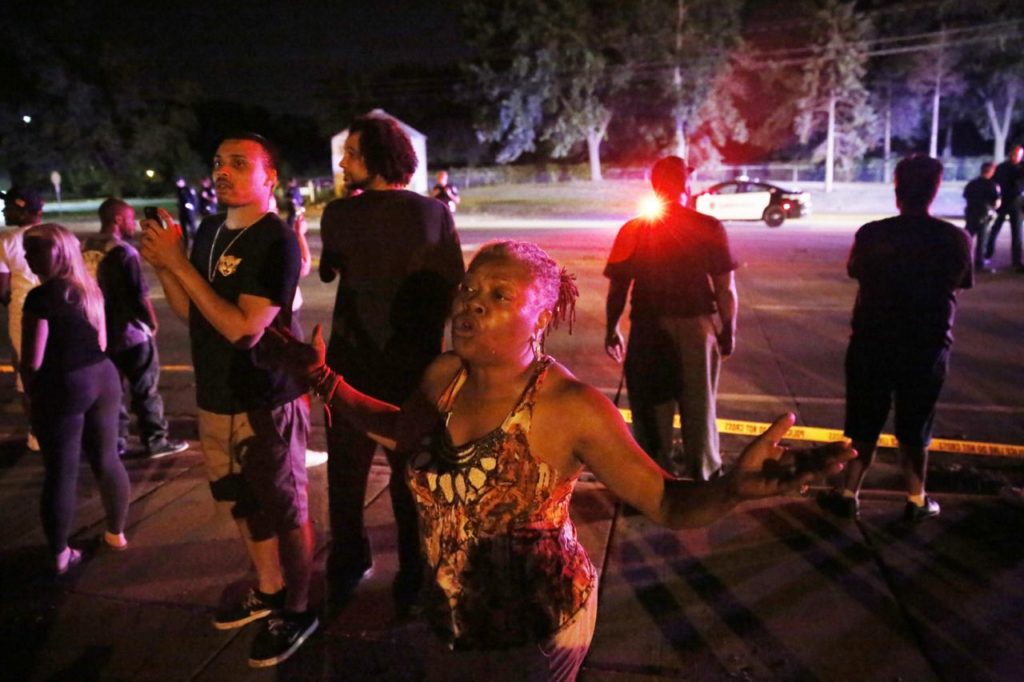
Ambushes in Dallas and Baton Rouge, Louisiana, and other shootings around the country led to a sharp increase in the number of police killed in the line of duty this year. From Jan. 1 through Wednesday, 135 officers lost their lives. Some died in traffic accidents, but nearly half were shot to death. That’s a 56 percent increase in shooting deaths over the previous year. Of the 64 who were fatally shot, 21 were killed in ambush attacks often fueled by anger over police use of force involving minorities. “We’ve never seen a year in my memory when we’ve had an increase of this magnitude in officer shooting deaths,” said Craig Floyd, president and chief executive of the National Law Enforcement Officers Memorial Fund. “These officers were killed simply because of the uniform they wear and the job they do. This is unacceptable to the humane society that we are.” In Dallas, a sniper on July 7 attacked at the end of what had been a peaceful rally against police brutality. He killed five law enforcement officers and wounded nine others – the largest death toll among law enforcement from a single event since the 9/11 attacks, which killed 72 officers. Months later, Dallas businesses and residents still display blue ribbons and banners declaring, “We support our Dallas police officers.” But even amid community support, the police department remains unsettled. Hundreds of officers have retired or left the force over the past six months as the city struggles to find a way to increase pay and save a failing police and fire pension system. Former Chief David Brown, who became a national figure in the aftermath, was among those who opted to retire. And interim Dallas Police Association president Frederick Frazier said that morale is “almost nonexistent.” “A lot of us are going through the motions at work. We’re hoping things will get better with our struggle,” he said. Frazier added that the attack was a “game changer. It changed the perception of law enforcement. It reversed the role after Ferguson. We were the pursuer and now, we’re being pursued.” Less than two weeks after the Dallas attack, a lone gunman in Baton Rouge shot and killed three officers and wounded three others outside a convenience store in the weeks after a black man, 37-year-old Alton Sterling, was shot and killed by police during a struggle. Baton Rouge Police Cpl. Lester Mitchell was partners with Matthew Gerald, one of the three slain officers, and was among the officers who raced to the scene of the shooting that also killed sheriff’s deputy Brad Garafola and officer Montrell Jackson. Mitchell has daily reminders of the deadly shootout, driving past the scene on his way to police headquarters. “Just passing there, you can’t help but replay it over and over again,” he said. Mitchell said the shooting has made him more alert and aware of potential dangers on patrol, sometimes in situations that wouldn’t have alarmed him before, like a hand in a pocket. “You learn to cope with it, because if you don’t, you can drive yourself crazy,” he said. The National Law Enforcement Officers Memorial Fund’s Floyd said the impact of this year has been profound on law enforcement. Agencies are struggling to recruit officers to their ranks and those who continue to serve “talk about how their head is now on a swivel.” “They’re always looking over their shoulder, always worrying about the next attack that could come at any time from any direction,” Floyd said. That was underscored by the slaying in November of a San Antonio detective who was fatally shot and killed outside police headquarters as he was writing a traffic ticket. The man accused of shooting him said he was angry about a child-custody battle and simply “lashed out at somebody who didn’t deserve it.” Republished with permission of the Associated Press.
Police shooting affects presidential politics in Charlotte
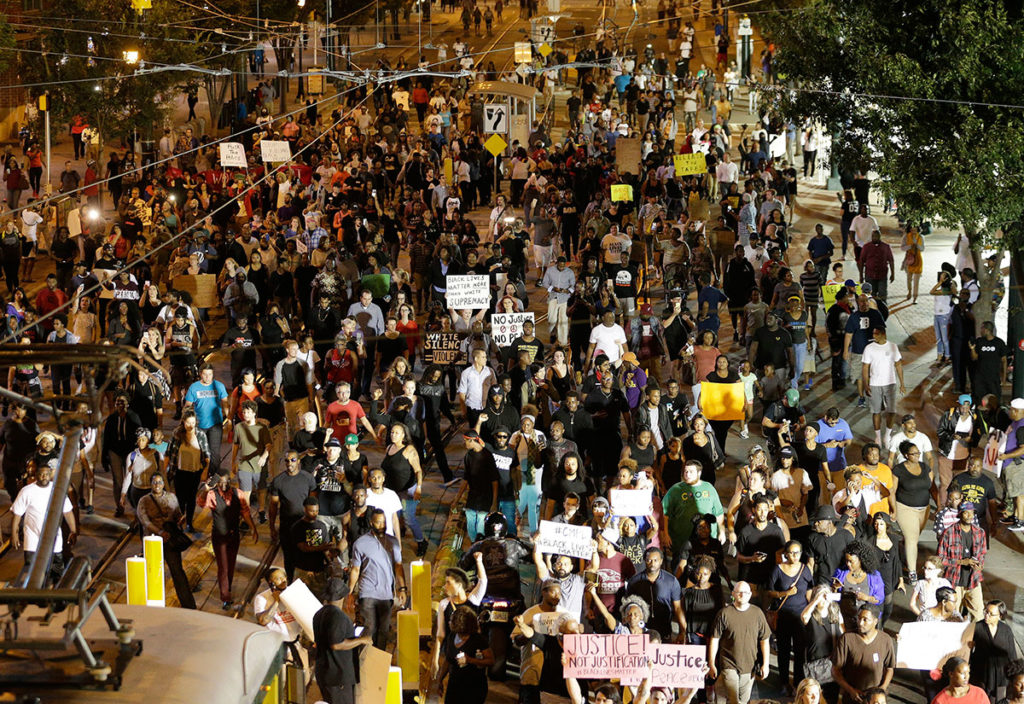
The killing of a black man by a Charlotte police officer, and the sometimes violent protests that followed, have intensified the political divide in a state crucial to deciding whether Hillary Clinton or Donald Trump wins the presidency. Republicans and Democrats alike say the killing of Keith Lamont Scott will energize both parties’ strongest supporters in a presidential battleground state that also has competitive races for governor and the U.S. Senate. Both camps are citing the case as they push familiar arguments on race relations, law enforcement and social unrest. “Both sides think they are right in this,” says Dee Stewart, a Republican consultant in North Carolina. “This all fits very well with Trump’s argument of ‘law and order’ and respecting our officers. It fits with the left’s narrative that anytime law enforcement acts with force in certain communities, it should be viewed with suspicion.” It’s unclear if or how Scott’s killing and its aftermath will affect undecided voters, but even subtle shifts in support can be crucial. Polls show a tight race in a state that Barack Obama barely lost in 2012 after barely winning in 2008. In the state-by-state contest for the presidency, it’s difficult to see how Trump can win the presidency without capturing North Carolina. Scott, 43, was shot Sept. 20 standing outside his vehicle. Police maintain he was armed. Video released by Charlotte-Mecklenburg authorities was inconclusive. The officer who shot Scott is also black. Both Trump and Clinton had planned appearances in Charlotte in the days after Scott’s death, but both canceled them. Trump has said little specifically about Scott and the Charlotte protests, beyond calling the situation “tragic.” But at Monday’s debate, he again cast himself as the “law-and-order” candidate. He chided Clinton for avoiding the same phrase, and he renewed his endorsement for the kind of “stop-and-frisk” police practices that critics deride as racial profiling. Clinton has campaigned extensively with Mothers of the Movement, a group of African-American women, some of whose sons have been killed by police. She called for Charlotte police to release their videos of the shootings before they had done so. Clinton also held a phone call with black pastors in the area. She campaigned Tuesday in the state capital, Raleigh, where she urged caution and said “there’s still a lot we don’t know” about Scott’s death and the police killing of Terence Crutcher four days earlier in Tulsa, Oklahoma. Throughout her campaign, Clinton has argued the United States must confront “systemic racism” in its law enforcement and criminal justice structure. Trump’s running mate Mike Pence has described that as “rhetoric of division” and declared that “the men and women of law enforcement are a not a force for racism in this country; they’re a force for good.” Alma Adams, a Democratic congresswoman whose district includes parts of Charlotte, said Clinton’s approach will appeal to African-American voters, millennials and others concerned about police practices. “They’re going to be looking for answers at the polls,” she said in an interview. Adams added that Trump’s rhetoric will stoke the Democratic base, pointing specifically to his comments a day after violent Charlotte protests dominated the news. Trump said “drugs are a very, very big factor in what you’re watching on television at night.” His campaign later said he was talking about America’s drug problem in general, not the protests. Still, Trump’s comments could influence voters like 19-year-old Niesy Figueroa, a student who said she knows some of Scott’s extended family and participated in peaceful protests. Figueroa said she’s not thrilled with casting her first presidential ballot for Clinton, but said Trump’s Charlotte reaction helps her get over her “hurt” that Bernie Sanders lost the Democratic nomination. “Trump? No,” Figueroa said. “He just seems a little racist.” Dallas Woodhouse, executive director of the state Republican Party, concedes that Democrats can add the Scott case to the argument aimed at their base. But he argues that the television images of the protests and Democratic rhetoric about police are more important to independent and moderate whites than anything Trump says about protesters. “Democrats come across always pointing the finger at police,” Woodhouse said. He recalled a scene at the Carolina Panthers football game Sunday in Charlotte, where he said he watched scores of fans seek out law enforcement officers. “This is still a Southern state, a cordial state, a state that has people lined up to thank the police because they think they are being unfairly maligned.” Republished with permission of the Associated Press.
Suburban NY police prep for 2016’s first presidential debate

Demonstrators are expected at Hofstra University for Monday night’s showdown between Donald Trump and Hillary Clinton, but police are keeping them at a distance from the debate hall. Police are setting up a designated protest area that is across a six-lane roadway from the actual presidential debate site. They say the goal will be to keep opposing groups from tangling with each other. “We’ll segregate the groups in order not to pour gasoline on a fire,” said Thomas Krumpter, the acting Nassau County police commissioner. He said police will not tolerate “any violations of law, but we will do everything we can to protect people’s rights for free speech.” Police and state court officials said contingency plans are in place in the event of mass arrests. They are preparing for up to 10,000 demonstrators, though its unknown how many might actually attend. Susan Gottehrer, director of the Nassau County chapter of the New York Civil Liberties Union, said her organization will have about 10 people monitoring the activities of police and demonstrators. Hofstra University, 25 miles east of New York City, was tapped this summer to pinch-hit as host for the first presidential debate after Ohio’s Wright State University dropped out. Police officials say the experience of hosting presidential debates at Hofstra in 2008 and 2012 is helping them prepare for Monday night’s debate. Krumpter said 1,000 officers will be on hand for the event, in addition to the Secret Service and state police, up from 600 officers in 2008 and 700 in 2012. The estimated cost of policing the event for the Nassau department is nearly $2 million. Michael Balboni, a former adviser on public safety to two New York governors, said the basketball arena where the candidates will debate is ideally insulated within the campus, and hundreds of yards from dormitories and classrooms, allowing planners to have several layers of security zones. Republished with permission of the Associated Press.
Mo Brooks defends law enforcement from Obama Administration’s ‘war on police’

Alabama 5th District U.S. Congressman Mo Brooks is taking a stand for America’s police officers. Standing before his peers in the U.S. House of Representatives, Brooks spoke out against what he considers to be the Obama Administration’s false and inflammatory anti-police rhetoric, and expressed his support for America’s law enforcement Thursday morning. “Time after time, after police shootings of African-Americans, the Obama Administration’s knee jerk, racially divisive strategy has been to paint a disturbingly false image of racial bias in police shootings that conflicts with a recent 2016 Harvard University study that found police are 24 percent less likely to fire upon African-Americans than Caucasian Americans,” Brooks said. Brooks is referring to a July paper by Harvard economics professor Roland G. Fryer Jr. who found no evidence of racial bias in police shootings. “On the most extreme use of force — officer-involved shootings — we find no racial differences in either the raw data or when contextual factors are taken into account,” said Fryer, who is black, in the abstract. According to Brooks, the Obama Administration’s relationship with America’s law enforcement has deteriorated so badly that William Johnson, the executive director of the National Association of Police Organizations, accuses Barack Obama of engaging in a “war on police”. “The solution, Mr. Speaker, is generating more respect for law and order and those who enforce it,” Brooks continued from the House floor. “That solution is absent in Obama Administration pronouncements.” “I want the public to know that I stand with the rule of law. I stand with America’s brave police officers who protect the rights and lives of all Americans. And I here and now publicly thank America’s law enforcement officers for risking their lives to protect law-abiding Americans from crime and anarchy.” Watch Brook’s speech in its entirety here:
Shooting of Dallas officers spurs acts of kindness to police
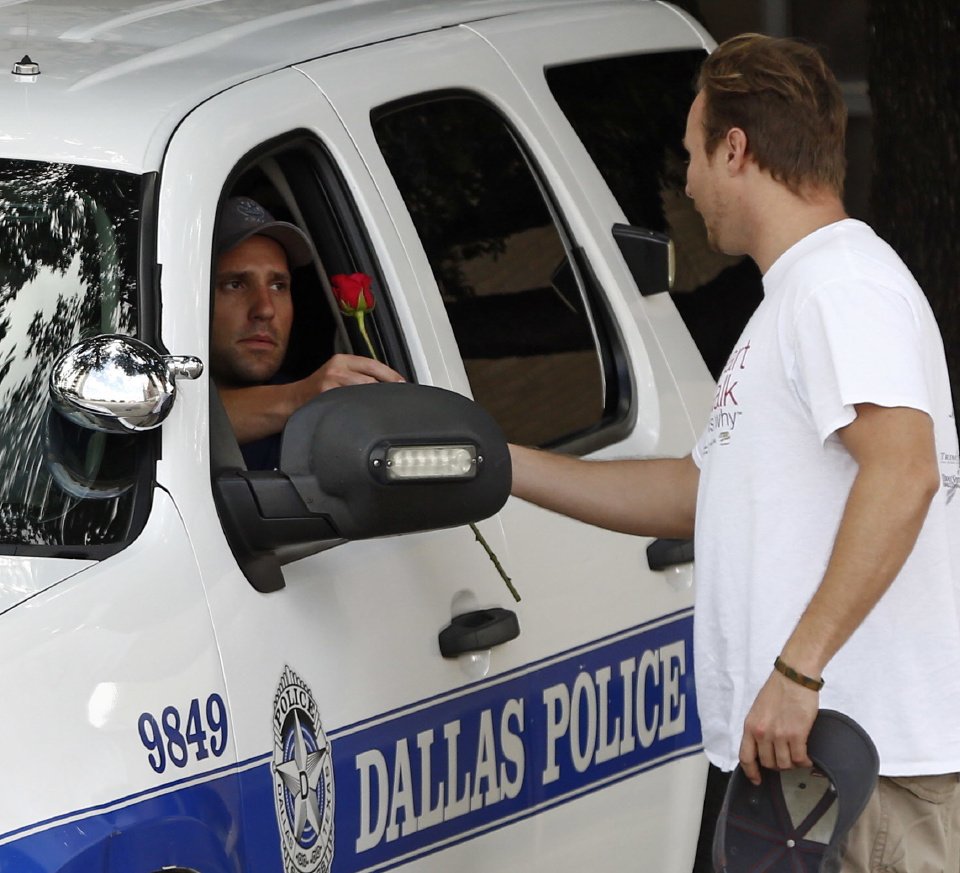
The Dallas shooting that killed five officers has spurred an outpouring of support for police, not only in Texas but hundreds of miles away. Around the country, people have showed up at local departments with flowers, sent social media messages or called to say thanks. They delivered coffee, pizzas, cakes and moments of solace for officers grieving after the deadliest day for U.S. law enforcement since the Sept. 11, 2001, attacks. SHARED SORROW One after another, members of the public lined up to hug uniformed officers at a community prayer service Friday in Dallas. Two patrol cars serving as a memorial outside of police headquarters were adorned with flowers, signs and flags by some of the people pausing to pay their respects to the five officers killed and seven wounded. John Fife, with his ball cap in hand, passed a red rose to an officer sitting in a vehicle guarding those headquarters. In another corner of the country, a Seattle officer accepted a matching flower from Jasen Frelot, one of several people from the faith community there who set out to show police support. ‘WE NEED THEM’ Officers also received roses in the Cleveland suburb of South Euclid, where they found single stems on their cruiser windshields Friday morning. The Rev. Carmen Cox Harwell, a Beachwood pastor and a former police chaplain, said she put flowers on Beachwood and South Euclid officers’ cars as a sign of gratitude. “I just want them to know that they’re loved and they’re supported and we need them,” she told WOIO-TV. COMFORT FOOD Abigail Bullard had similar thoughts while home with her 6- and 10-year-old sons in suburban Philadelphia, where the younger boy’s fascination with emergency services personnel has developed into a friendship with a few Radnor Township officers. Bullard had observed the kinship within their profession and knew they’d be affected by this week’s news, so she and her sons delivered cookies and soft pretzels as comfort. “It was important to me to say, here we have two young black children that are trying to do the right thing because friends of ours have had a death in the family,” she said. When she shared the story on Facebook, she concluded it simply: “Not all young black men are bad, and not all police officers are bad.” A few miles down the road, the Lower Merion Police Department said its officers had heavy hearts but full bellies after another woman and her son delivered a stack of pizzas Friday. They also received coffee and doughnuts, a gesture reported by numerous police departments this weekend. One of them, the Voorhees Police Department in New Jersey, said such actions “have made us feel better during a very sad time to be a police officer.” STOPPED FOR THANKS Still others simply stopped officers on the street to chat or offer hugs. “It’s just been amazing. Our guys can’t go out this morning without getting stopped by people wanting to thank them,” Dustin Dwight, a spokesman for Louisiana State Police Troop L, told NOLA.comThe Times-Picayune on Friday. In Chattanooga, Tennessee, officers were getting extra handshakes from strangers at a local concert Friday night. “They always comfort and, I guess, wrap their arms around us, to protect us as well as we protect them,” Chattanooga Sgt. Tommy Meeks told WRCB-TV. ‘ROUGH FEW DAYS’ In Ballwin, Missouri, where a suburban St. Louis policeman was shot and critically hurt during a Friday traffic stop, Andrew Kulha brought the investigators water. He told KMOV-TV he thought it had “been a rough few days to be an officer.” The Dallas shooting occurred during a Thursday night protest over fatal police shootings of black men in Minnesota and Louisiana earlier in the week. Republished with permission of the Associated Press.
Luther Strange launches statewide law enforcement training sessions
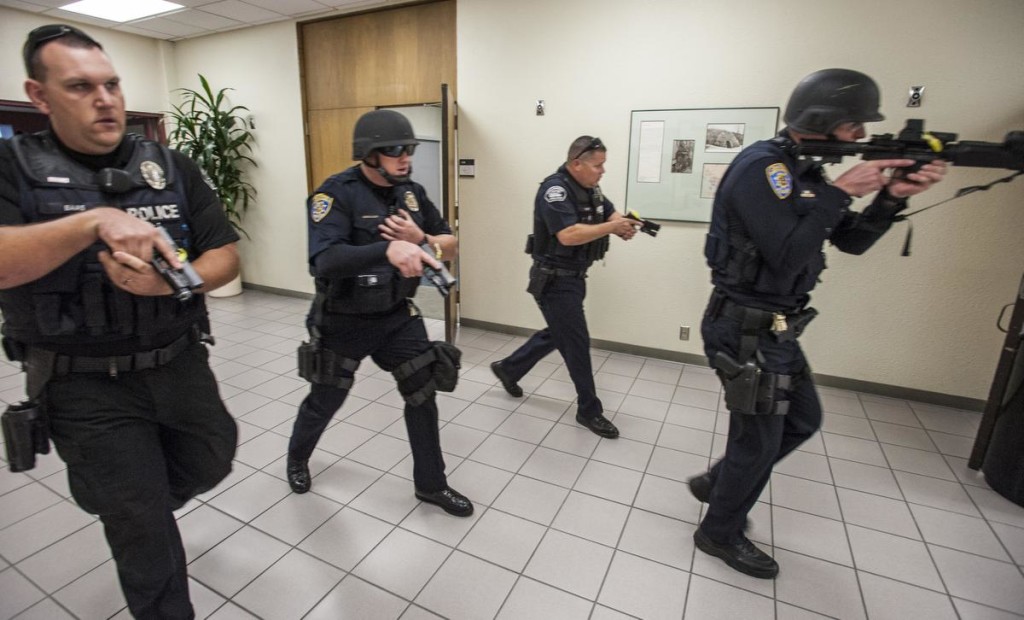
Alabama Attorney General Luther Strange, the state’s top law enforcement official, announced Tuesday morning an initiative to host training sessions for local police and sheriffs departments across the state to make sure those protecting every Alabama community are up to date on the latest tools and technologies in investigating and solving crimes. “I’m pleased to announce that my office, working with local sheriffs, chiefs of police and district attorneys, will provide free training to law enforcement to enhance their crime-solving skills,” said Strange in a press release. This isn’t the first initiative Strange has undertaken to provide the state’s law enforcement officers with the newest and best training. In a time of increased scrutiny of police, the attorney general’s office began an annual Law Enforcement Summit in Montgomery. 2015’s summit, held in September, focused on the “sweeping opioid epidemic” recently being combatted at the local, state, and federal levels. Officers were also taught how to use technology to stay ahead of the criminal curve during investigations, including digital evidence found on cell phones. Approximately 700 Law Enforcement Officers (LEOs) from across the state attended. The more local training, AG Strange believes, will ultimately provide even more benefits to the LEOs and their communities. “The focus of the first round of law enforcement training will center on violent crime investigations,” explained Strange. “The training will cover the investigation process from start to finish, notably how to secure a crime scene and collect evidence, including digital evidence. The course will also cover search and seizure laws to include writing of search warrants for electronic data. The class will ultimately conclude with best practices in keeping and maintaining evidence for cold case investigations” The first round of local training will be held in Montgomery County on June 28th, with subsequent training events in the coming months in Mobile, Baldwin, Houston, Shelby and Walker counties, as well as other areas.

